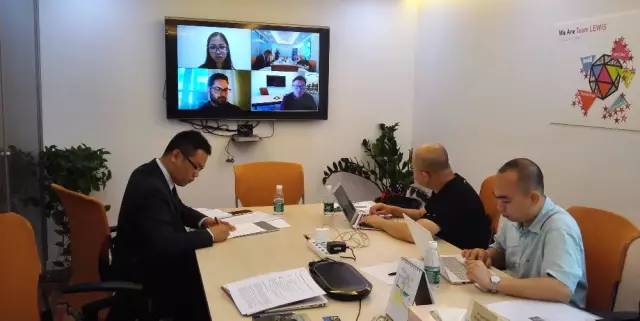
On the eve of Linux Con 2017 (Beijing), we at Linux China, together with 51CTO and Open Source China, conducted an exclusive video interview across the ocean with Jim Zemlin, executive director of the Linux Foundation.
In this exclusive interview, Mr. Jim answered several questions of concern in the open source community and the Internet field, and disclosed some interesting news and data.

First of all, Mr. Jim introduced the LinuxCon + ContainerCon + CloudOpen conference (hereinafter referred to as LC3):
First of all, thank you all for attending our event today. Let me first introduce to you our LC3 conference. LC3 is the first time we hold such an event in China. At this event, we invited some leaders of the open source community to come to China together.
We can see that open source has achieved sustainable growth around the world in the past few years, whether in cloud computing, automotive, or other fields. We have also seen that China is increasingly involved in the development of open source.
At this event, Linus Torvalds, founder of the Linux Foundation, will be invited to visit China for the first time. At the same time, we will also invite some open source and technology leaders to come to China to meet with Chinese developers and companies using Linux infrastructure. Let’s discuss open source issues together. Including the project executive director of OpenStack and the leader of the Kubernetes project. There is also hyperledger, which is a blockchain project, and we also invited its executive director. and representatives from the Open Networking Foundation. In addition, representatives of some large companies, such as Chinese companies such as Huawei, Alibaba, and Baidu, will also participate in this event; foreign companies such as Google, IBM, Amazon, etc. will also participate in this event.
We hope that this event will provide an excellent opportunity for Chinese companies and organizations that use Linux to develop solutions, so that they can chat with some of the world's leading open source project developers or leaders.
We can see that Linux is still widely used in China, such as Alibaba Cloud and some Huawei products, including Tencent and Baidu. In fact, they are all using Linux extensively, so this event can provide domestic enterprises with Build a bridge with leading domestic open source developers and foreign leading open source developers to discuss open source topics together.
During the hour-long interview that followed, we also asked Mr. Jim several interesting questions, some of which are excerpted below:
1. LinuxCon is the first high-profile large-scale event held by the Linux Foundation in China. I would like to know, does this mean that the Linux Foundation officially launches activities in China? What if the Linux Foundation intensifies its activities in China, and the main direction of work is to establish a cooperative relationship between the government and enterprises? Or will it support and unite groups such as university societies, LUGs, and open source communities? Will it further establish formal branches and even personnel in China?
Jim:
We have actually started to build our own agency in China last year.
Historically, we have mainly cooperated with some open source companies, such as Huawei and China Mobile; we will also cooperate with some local community organizations. Of course, we still hope to continue to expand our activities in China, especially in the field of network and cloud computing. In terms of network, we have cooperated with China's three major telecom operators, including China Mobile, China Telecom, China Unicom, ZTE, and Huawei. In terms of cloud computing, we have some cloud native (CNCF) projects, mainly cooperating with three major companies, including Alibaba Cloud, Tencent, and Baidu.
2. In the current rapid development of the Internet, mobile Internet and Internet of Things, we are facing more and more security threats, which are becoming more and more widespread. For example, there have been several major security incidents in recent years, ranging from shell shock to hard work . From heartbleed to the recent SMB viruses, they have all had a great impact on the Internet and society. So is the security of Linux capable of facing security attacks, and even preventing and containing the threats posed by security risks? Will the Linux Foundation put security above functionality in guiding the development of Linux? Mr. Jim, what do you think of this issue?
Jim:
In fact, if you want to compare Linux and Windows in terms of security, I don't think it is too accurate. Because from a security perspective, if you develop any relatively complex software system, as long as the system is complex, there will inevitably be security vulnerabilities.
From a security perspective, the development process of Linux software will actually have thousands of open source developers reviewing its security, and all these codes will actually go through a "peer review" The process, through such practices and processes, can ensure that the developed Linux software is safe.
Therefore, in the process of our Linux development, we hope to establish some safety code specifications. We started projects like CoreOS mainly to help us develop safe and reliable software. These codes can be audited to ensure that the codes we develop are the safest. All in all, security is the top priority of all our projects, including Linux, and it is a matter of great concern and importance.
3. Will the combination of Linux with artificial intelligence, cloud technology, Internet of Things, etc. enter an explosive stage in the near future?
Jim:
In terms of cloud computing, like the well-known Kubernetes, it is developing very, very fast, and there are many developers involved. We know that 380 companies and more than 2,500 developers are working on Kubernetes development, and there are nearly 50,000 commits and 8,000 forks in the GitHub warehouse. So, we can see that the scale is very, very large. By the way, the executive director of Kubernetes will also come to China in three weeks to introduce the development of Kubernetes.
In addition to cloud computing, we are also involved in Internet of Things projects, such as our EdgeX project and IoT projects. These also have many open source projects, such as artificial intelligence, cloud computing or the Internet of Things. These projects we held in China There will be more and more activities, and our layout in China will also expand. Everyone can learn more about these fields by attending our conferences.
4. More and more companies are participating in code contributions. What changes will this bring to the development and promotion of Linux?
Jim:
New enterprises and new institutions join the Linux activities, which will bring more value to Linux. For example, Toyota announced last week in Japan that its best-selling Camry car will use Linux. The automotive industry joining Linux means that they will put forward new requirements for our Linux kernel. It is also good news for those manufacturers who develop solutions for embedded systems, because joining Linux means that their test coverage is larger. Now, more people are reviewing this code.
In general, we feel that the more enterprises and organizational structures join the Linux camp, the better it will actually be for the development of our Linux.
5. What kind of sparks do you think will emerge when open source and artificial intelligence collide?
Jim:
When it comes to artificial intelligence, virtually all infrastructure needs the application of artificial intelligence. Among the open source projects of artificial intelligence, the largest one now is the TensorFlow project led by Google. We also invited some guests to this conference to give some introductions in this regard.
6. More and more developers in China are joining open source, but there are very few high-quality open source from China on GitHub. Most of them come from abroad. What do you think is needed to achieve high-quality open source software? Environment and conditions?
Jim:
In fact, we have also seen that some high-quality open source projects in China are also constantly developing. Last year, we announced an open source project with Huawei and China Mobile. Later, China Telecom and China Unicom joined. Later, some international operators, such as AT&T and Orange, also joined, and we joined forces with some Chinese companies. We hope that Able to build the world's largest open source telecommunications infrastructure.
The number of open source projects in China is not large compared with that in the United States. The first reason is historical reasons, because the history of software development in the United States is longer than that in China. But we can see that China is also making great strides to catch up. The reason why we hold the LC3 conference in China is also to allow the world's top developers and some Chinese companies and some top developers to sit together to discuss and share best practices. We believe that there will be more in China in the future. Independent open source project.
We also know that our Linux founder Linus Torvalds will also come to China and have good exchanges with these Chinese open source developers, hoping to promote the continuous development and expansion of China's open source projects.
I think this LC3 conference is a unique opportunity because it brings together the world's leading developers. For example, how far can an elite developer differ from an average software developer? Just like Picasso and a painter in an ordinary home, there is such a big difference. Therefore, this event provides everyone with a good opportunity to discuss issues with the world's best development and computing experts. We also hope that through this event, everyone will learn how to better utilize open source for development For new products and services, we are also committed to working closely with these developers and industries in China to develop more open source code that can bring value.
After an hour of face-to-face communication, we learned that the Linux Foundation is interested in carrying out more and higher-level exchanges and cooperation in China to create a better environment for promoting open source and technological progress in China.
Let us look forward to the arrival of Jim, Linus and more open source leaders to share their experience and understanding of open source and technological progress at the LC3 conference.